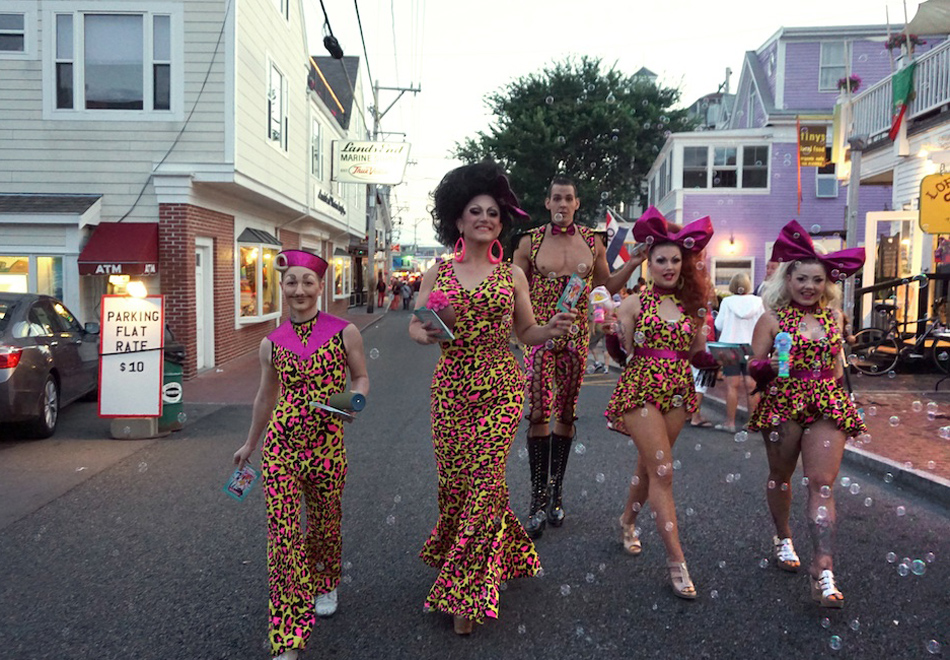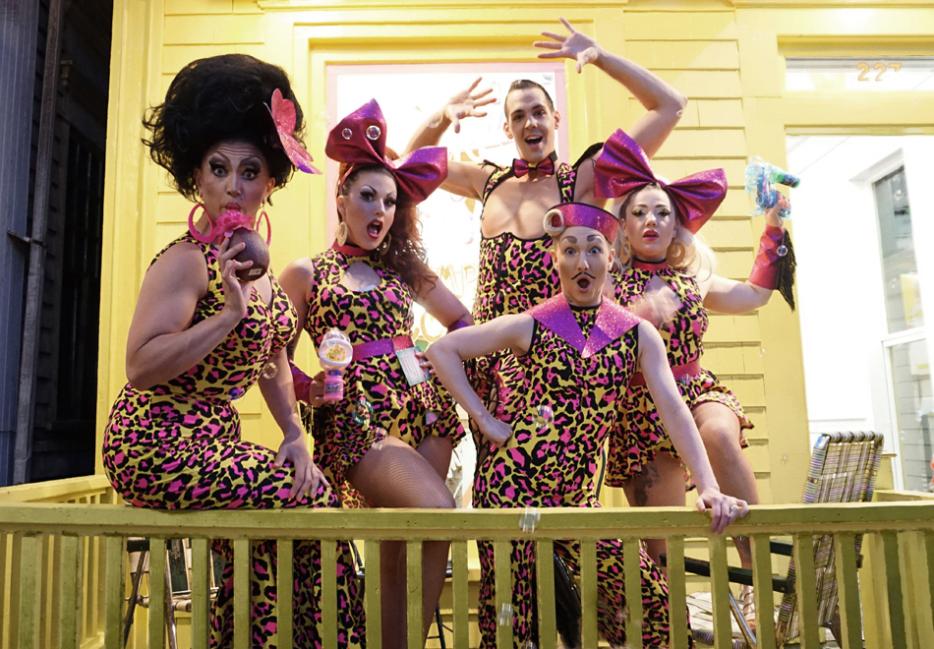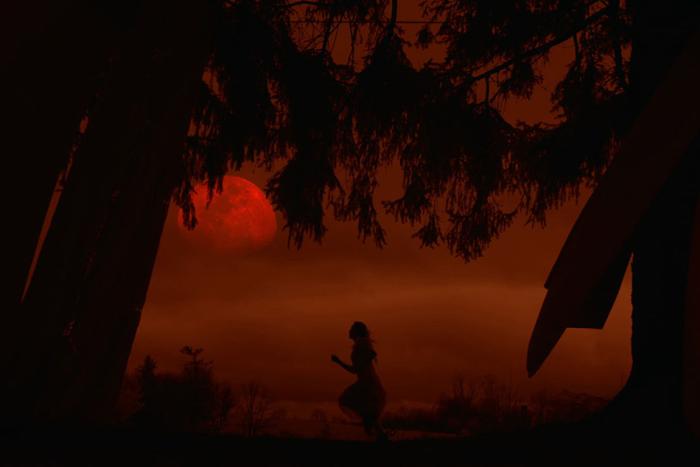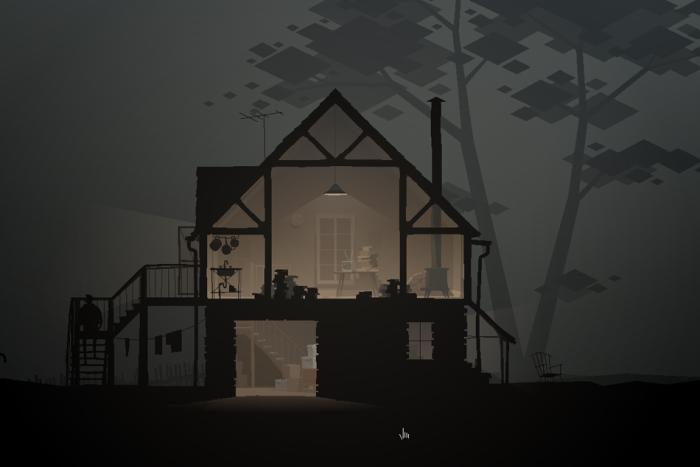On a Thursday night in late July, the Atomic Bombshells strut down Commercial Street in the center of Provincetown, Massachusetts, wearing outfits made of yellow and pink cheetah print spandex. In the distance between the Happy Camper ice cream and coffee shop and the lobster roll stand, Lou Henry Hoover, BenDeLaCreme (a drag queen who won Miss Congeniality on RuPaul’s Drag Race), Kitten LaRue, Ruby Mimosa, and Mr. Gorgeous scan for the willing or persuadable.
P-Town is one of the oldest gay vacation destinations in the United States. BenDeLaCreme calls it “the city where soft serve meets sodomy,” and periodically children with ice cream cones do stop to gawk at the group. It’s “family week,” and the burlesque show the Bombshells are promoting is—sort of—family friendly. There’s no actual nudity or bad language. “It would go right over their heads,” DeLaCreme says, sweeping a hand over six inches of firmly secured wig to demonstrate.
“Jungle Boogie” plays on a portable speaker as Lou Henry Hoover hands a flier to a middle-aged man. "Come to the show tonight," he chirps, smiling as he walks past.
"I think that one was really a girl," he tells the woman next to him.
Here is the hurdle Ricki Mason must constantly leap across: how to get a random guy and his wife to see her onstage persona, Lou, as more than a stripping girl in a moustache.
A classically trained dancer with a sweet, expressive face, Lou Henry Hoover is one of the most well-loved personas in boylesque—burlesque strip shows starring male-identified performers, sometimes in drag but typically not—and also one of the most unusual. Not just because of the dance-school pedigree, but also because Lou is the drag persona of Ricki Mason a person who feels female (albeit what she calls “a real peacock of a butch”) in her day-to-day life and male when dancing (and stripping) onstage.
We expect stripping to reveal more about a person’s gender. This isn’t what happens when Lou performs. Somehow, wearing fewer clothes brings greater freedom to play with identity. Without pasties or a g-string, Mason-as-Lou gets to “invent what nude means.” Sometimes it’s a balloon cock and a dickey; on other occasions, “nude” is a binder, a glued-on codpiece, or a strategically placed beer bottle.
A mix of dance skills, charisma, and unusual gender presentation has made Lou a celebrated outsider in the burlesque world—a performance community that revels in its own outsider status. Because Lou doesn’t fit perfectly anywhere, he’s had the opportunity to take the stage pretty much everywhere. But the farther and wider Lou performs, the less likely it will be that his audiences have spent time thinking about things like the politics of queerness, or gender identity in drag performance.
On the streets of Provincetown, people of all ages swarm BenDeLaCreme. They are star struck. She was on TV, after all. But professional gender-benders have always had a tenuous relationship with the wider public that sees drag as no different from a Halloween costume. At best, they’re embraced but largely misunderstood. At worst, they’re mocked as sad, cartoonish approximations of actual men and women.
*
Six weeks earlier, Ricki Mason had been preparing for the Burlesque Hall of Fame Weekender competition—the burlesque world’s Academy Awards. Snaps had to be sewn, pompoms purchased, and glitter glued before Mason and her wife, fellow Atomic Bombshell Susanna Welbourne, also known at Kitten LaRue, could pack seven outfits into six suitcases for the trip to Las Vegas. One of Susanna’s wigs would fill an entire bag.
At close to eight in the evening, Mason walked to Beauty Curators on Sixth Avenue in Manhattan. In cut-off jean shorts and an oversized Madonna T-shirt, she carried a Styrofoam head somewhere in her cluster of shopping bags. The store had just closed, so Mason knocked on the window and a woman with a high, shiny ponytail opened the door.
Mason had done burlesque once before; dolled up as a pretty lady, she says the strip tease “didn’t feel powerful” to her the way it did for some women. But then she created a boylesque act where she was an angel who was becoming human to be with his lady; stripping in drag offered “a secret key to a new place.” The shelves are lined with building materials for New York City’s nightlife looks—bottles of hair product, brushes and combs, and a rainbow of hair extensions. This is Home Depot for drag queens. Mason’s wig designer, Marco, was at work in the back. Matted and crushed hairpieces waited for rehabilitation on the table behind him. He was worried that a wig made from Barbie heads might not be ready in time for this year’s Gay Pride celebrations.
“You want to try?” Marco presented a chestnut pompadour, like a fuzzy wave crashing above the forehead. Mason’s hair—a lighter brown, flatter version of the pompadour—was already under a flesh-colored wig cap.
She twisted in her chair to inspect the back and sides in the mirror. Staring back at Mason is Lou, an earnest, all-American guy who tries hard and fails harder, whether he’s a cowboy, a Romeo, a disco dancer, or a clown. Mason has been performing as this perpetual underdog, the delightful and unflappable loser with a heart of gold, for more than seven years. By now, she is simply “Lou” to many friends and fans.
In the back of Beauty Curators, Mason and Marco fussed over the wig, pulling down the sideburns and pressing the puffy, pretty-boy upsweep into shape. Lou wears this wig during a cowboy-themed act called “Wanted,” a number he and Kitten would perform during the Burlesque Hall of Fame Weekender’s “small groups” competition. In pink western wear, Lou and Kitten rob a bank, shoot some guns, and tear each other’s clothes off before losing all the money.
In Vegas Lou would also compete against three other dancers for the title of King of Boylesque. As far as anyone can remember, Lou is the first drag king boylesque competitor in the pageant’s 25-year history.
*
It hasn’t always been chest binders and glitter mustaches for Ricki Mason. Growing up in Lexington, Massachusetts, Mason was the youngest child in a family of four with strong ties to the military. When she was nine, her older brother left home for the naval academy. For a while she wanted to go too, and her parents were thrilled. “You’ll love it there,” they encouraged. “There’s a glee club.”
Performing soon took over her adolescent life. She’d been taking dance classes every day, dreaming of studying musical theater at the University of Michigan and dancing in Fosse, but she didn’t make it into the program. At Michigan, she settled for and then fell in love with modern dance, where every movement has a precise meaning and intention.
After college, Mason moved to Seattle to front a modern dance company called LAUNCH. The city is home to a vibrant community of drag and circus performers. Far away from people she’d grown up with, Mason felt freer to express queerness on and off stage, and it was here that she discovered boylesque.







